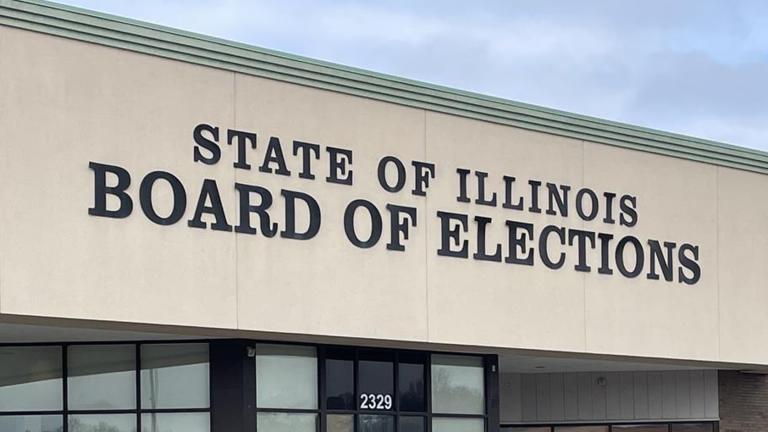Will an amendment asking voters to choose whether they'd like an independent process to redraw legislative maps actually make it to the November ballot? A lot depends on what elections officials decide today. Paris Schutz has more.
Watch a video explaining redistricting and the proposed amendment, view a map how each state approaches redistricting, and read the proposed amendment.
Yes for Independent Maps is the organization behind the amendment that would give an independent commission the power to draw legislative maps instead of politicians. And the campaign believes it has a secret weapon to attract voters to the issue: comedy. Watch the video below:
The redistricting process varies from state to state, and in most states, the state legislature has the authority to draw the legislative maps. View a map detailing how each state approaches the redistricting process.
State legislature* Maine, New York, Rhode Island, Vermont, and Virginia appoint advisory commissions to help guide the legislature in drawing district lines. The legislature is not bound by the recommendations of the advisory commissions.
State legislature** If the state legislature fails to successfully pass a plan, a backup commission can be looked to. The composition of backup commissions vary from the states that have them—Connecticut, Illinois, Maryland, Mississippi, Oklahoma, Oregon, and Texas.
State legislature*** In Iowa, the advisory body to the state legislature is the Legislative Services Agency, which is composed of civil servants committed to nonpartisanship. The LSA prepares draft redistricting plans according to criteria set by statute. The LSA looks to a five-person independent commission in instances where the statutory criteria leave discretionary latitude. Although the Iowa state legislature has the ability to reject three LSA plans, it has not done so since LSA’s inception in 1980.
Politician commissions are elected officials that may serve as members. The structure of politician commissions varies from state to state.
--Map by Kristen Thometz
Read Illinois' Legislative Redistricting Amendment:
Section 3. Legislative Redistricting
(a) The Independent Redistricting Commission comprising 11 Commissioners shall adopt and file with the Secretary of State a district plan for Legislative Districts and Representative Districts by June 30 of the year following each Federal decennial census.
Legislative Districts shall be contiguous and substantially equal in population. Representative Districts shall be contiguous and substantially equal in population. The district plan shall comply with federal law. Subject to the foregoing, the Commission shall apply the following criteria: (1) the district plan shall not dilute or diminish the ability of a racial or language minority community to elect the candidates of its choice, including when voting in concert with other persons; (2) districts shall respect the geographic integrity of units of local government; (3) districts shall respect the geographic integrity of communities sharing common social and economic interests, which do not include relationships with political parties or candidates for office; and (4) the district plan shall not either purposefully or significantly discriminate against or favor any political party or group. In designing the district plan, the Commission shall consider party registration and voting history data only to assess compliance with the foregoing criteria, and shall not consider the residence of any person.
The Commission shall hold at least one public hearing in each Judicial District before, and at least one public hearing in each Judicial District after, releasing the initial proposed district plan. The Commission may not adopt a final district plan unless the plan to be adopted without further amendment, and a report explaining its compliance with this Constitution and the criteria applied, have been publicly noticed at least seven days before the final vote on such plan. An adopted district plan shall have the force and effect of law and shall be published promptly by the Secretary of State.
The State Board of Elections shall provide the Commission and the public with complete and accurate census information and technology sufficient to propose district plans. The Commission shall adopt rules governing its procedure and the implementation of matters under this Section.
(b) The Commission shall act in public meetings by affirmative vote of six Commissioners, except that approval of any district plan shall require the affirmative vote of at least (1) seven Commissioners total, (2) two Commissioners from each political party whose candidate for Governor received the most and second-most votes cast in the last general election for Governor and (3) two Commissioners not affiliated with either such political party. The Commission shall elect its chairperson and vice chairperson, who shall not be affiliated with the same political party. Six Commissioners shall constitute a quorum. All meetings of the Commission attended by a majority of its quorum, except for meetings qualified under attorney-client privilege during pending litigation, shall be open to the public and publicly noticed at least two days prior to the meeting. All records of the Commission, including communications between Commissioners regarding the Commission’s work, shall be open for public inspection, except for records qualified under attorney-client privilege during pending litigation. The Commission may retain assistance from counsel, technical staff and other persons with relevant skills and shall be provided with adequate resources to complete its work.
(c) For the purpose of conducting the Commissioner selection process, an Applicant Review Panel comprising three Reviewers shall be chosen in the following manner in the year in which each census occurs. Beginning not later than January 1 and ending not later than March 1 of the year in which the census occurs, the Auditor General shall request and accept applications to serve as Reviewers. By March 31, the Auditor General shall appoint a Panel of three Reviewers, selected by random draw from eligible applicants.
The Panel shall act in public meetings by affirmative vote of two Reviewers. All meetings of the Panel shall be open to the public and publicly noticed at least two days prior to the meeting. All records of the Panel, including applications to serve on the Panel or the Commission, shall be open for public inspection, except private information about applicants for which there is no compelling public interest in disclosure. The Panel may retain assistance from counsel, technical staff and other persons with relevant skills and shall be provided with adequate resources to complete its work.
(d) A Commission shall be chosen in the following manner in the year in which each census occurs.
Beginning not later than January 1 and ending not later than March 1 of the year in which the census occurs, the Auditor General shall request and accept applications to serve as Commissioners.
By May 31, the Applicant Review Panel shall select 100 eligible applicants based on their relevant analytical skills, impartiality, and ability to contribute to a fair redistricting process, and shall ensure that such applicants reflect the demographic and geographic diversity of the State. The Speaker and Minority Leader of the House of Representatives and the President and Minority Leader of the Senate each may remove up to five of the applicants selected by the Panel.
By June 30, the Panel shall publicly select seven Commissioners by random draw from the remaining applicants; of those seven Commissioners, including any replacements, (1) the seven Commissioners shall reside among the Judicial Districts in the same proportion as the number of Judges elected therefrom under Section 3 of Article VI of this Constitution, (2) two Commissioners shall be affiliated with the political party whose candidate for Governor received the most votes cast in the last general election for Governor, two Commissioners shall be affiliated with the political party whose candidate for Governor received the second-most votes cast in such election, and the remaining three Commissioners shall not be affiliated with either such political party, and (3) no more than two Commissioners may be affiliated with the same political party. The Speaker and Minority Leader of the House of Representatives and the President and Minority Leader of the Senate each shall appoint one Commissioner from among the remaining applicants on the basis of the appointee’s contribution to the demographic and geographic diversity of the Commission.
(e) To be eligible to serve as a Reviewer, a person must have education and experience in the examination and assessment of personnel, records, systems, or procedures for ten years preceding his or her application, must have demonstrated understanding of and adherence to standards of ethical conduct, and must not have been affiliated with any political party within the three years preceding appointment. To be eligible to serve as a Commissioner, Special Commissioner, or Reviewer, a person must (1) be a resident and registered voter of the State for the four years preceding appointment, (2) within the three years preceding appointment, must not have been the holder of, or a candidate for, any public office in the State, an employee or officer of the State or a unit of local government or a political party, registered as a lobbyist anywhere in the United States, or party to a contract to provide goods or services to the State or a principal, officer, or executive employee of such a contractor, and (3) within the three years preceding appointment, must not have resided with any person described in clause (2) of this subsection. For ten years after service as a Commissioner or Special Commissioner, a person is ineligible to serve as a Senator, Representative, officer of the Executive Branch, Judge, or Associate Judge of the State or an officer or employee of the State whose appointment is subject to confirmation by the Senate. A vacancy on the Commission or Panel shall be filled within five days by an eligible applicant in the manner in which the office was previously filled; with respect to the Commission, the replacement Commissioner shall be drawn where possible from the remaining applicants previously selected by the Panel.
(f) If the Commission fails to adopt and file with the Secretary of State a district plan by June 30 of the year following a Federal decennial census, the Chief Justice of the Supreme Court and the most senior Judge of the Supreme Court who is not affiliated with the same political party as the Chief Justice shall appoint jointly by July 31 a Special Commissioner for Redistricting. The Special Commissioner shall design and file with the Secretary of State by August 31 a district plan satisfying the requirements and criteria set forth in subsection (a) and a report explaining its compliance with this Constitution and the criteria applied. The Special Commissioner shall hold at least one public hearing in the State before releasing his or her initial proposed district plan and at least one public hearing in a different location in the State after releasing his or her initial proposed district plan and before filing the final district plan with the Secretary of State. The district plan shall have the force and effect of law and shall be published promptly by the Secretary of State.
(g) The Supreme Court shall have original jurisdiction in cases relating to matters under this Section. The Commission shall have exclusive authority, and shall be provided adequate resources, to defend any district plan adopted by the Commission.







